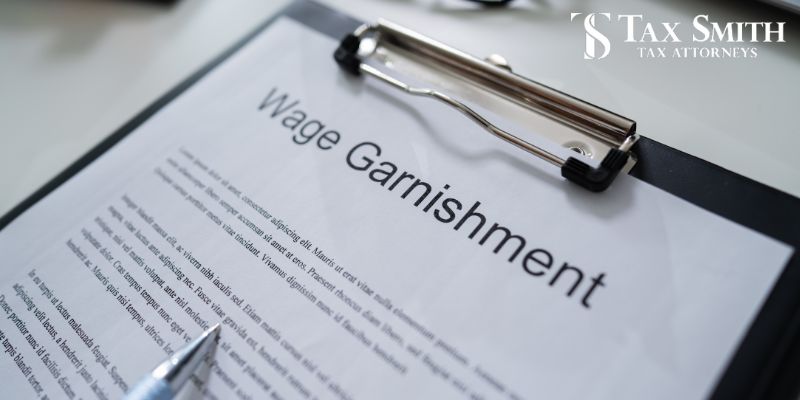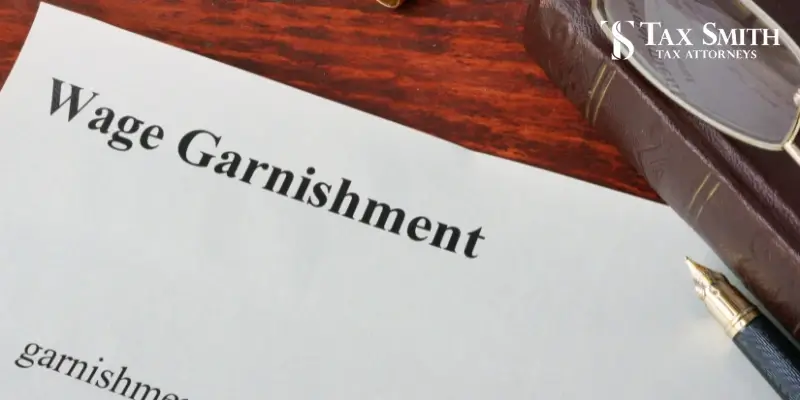1548 The Greens Way – Ste. 4 Jacksonville Beach FL 32250
St Augustine Wage Garnishment Lawyer
St. Augustine Wage Garnishment Attorney
Wage garnishment occurs when you owe taxes and have failed to pay them for some time, so the IRS (Internal Revenue Service) turns to your paycheck to collect the taxes owed. If you are dealing with garnished wages, you need a St. Augustine wage garnishment lawyer to look into your case. They can determine how to prevent garnishment or negotiate a more ideal payment plan for you.
Wage garnishment is rarely the first step the IRS will use to collect unpaid taxes, but it can be devastating if you have a tight budget and rely on the full amount of your paycheck to cover monthly costs and bills. If notices and other informational tools fail to recover owed taxes, the IRS may take up to 25% of your wages to pay your debt. An experienced tax attorney is necessary to protect the income you need to live, and they can determine if you have other options for settling your debt. Speaking with a St. Augustine tax relief lawyer can help you explore ways to reduce or eliminate wage garnishment.

Tax Smith Tax Attorneys: Wage Garnishment Lawyers in St. Augustine
The team of attorneys and legal professionals at Tax Smith Tax Attorneys are qualified in tax law and can provide reliable legal advice. We advocate for individuals and families dealing with the financial turmoil of wage garnishment, liens, levies, and similar tax problems. The attorneys on our team have decades of collective experience in tax law, which we use to give you honest and straightforward advice about how to handle your taxes.
At Tax Smith Tax Attorneys, we know that having your wages garnished can be frustrating and incredibly stressful. We can provide the knowledge and resources you need to understand how to navigate your taxes effectively. Our firm can guide you through your options to prevent or lower your wage garnishment.
Understanding Wage Garnishment in St. Augustine
The IRS may take owed taxes directly from your paycheck by notifying your employer that you owe federal taxes. While some types of wage garnishment require court approval, this is not the case for unpaid taxes.
Your employer is then required to withhold a specific percentage of your income from each pay period and provide it directly to the IRS. Garnishment can apply to your salary, hourly wages, commissions, and bonuses. Wage garnishment can even impact you if you are self-employed. The IRS can garnish the accounts receivable by your business. This can have a significant impact on your professional reputation.
Your wages could be garnished until the debt is paid if you do not take any steps to address it. The percentage garnished cannot be higher than 25%. The IRS can take up to 15% from Social Security benefits or military retirement benefits if that is what you live on. If you’re wondering how much of your wages could legally be withheld, understanding wage garnishment limits can help you prepare for potential deductions. In some situations, the IRS will take more serious steps in addition to wage garnishment, such as levies on accounts or liens on property. Beyond wage garnishment, the IRS can impose various penalties, so understanding the different types of IRS tax penalties can help taxpayers avoid costly consequences.
Strategies to Defend Against Wage Garnishment
If you are not financially able to settle your tax debt, there may be other options to defend against wage garnishment in St. Augustine, FL. Negotiating the garnishment or a settlement is one option. An attorney can help you negotiate a lower payment for the future. You could also negotiate a tax settlement of a one-time payment or payment plan, which could mean the end of garnishment.
Some individuals are exempt from garnishment due to specific circumstances, such as your income or dependents. It’s important to file for these exemptions quickly, once you know your wages are being garnished, and object to the garnishment. If you are approved for the exemption, it may still take some time for the change to be processed, and your wages may be garnished during that time.
Specific types of bankruptcy may also be an option to avoid wage garnishment. To determine what the right course of action is for you, speak with a tax attorney who can help guide you through your options.

FAQs About St. Augustine, FL Wage Garnishment Law
How Do I Fight Wage Garnishment in Florida?
There are ways to negotiate wage garnishment down to a lesser amount, and an attorney can help you determine other ideal routes to limit your debt. Paying the debt you owe the IRS is one way to eliminate the debt and prevent wage garnishment, but not all individuals have the ability to pay their entire debt. This is when an attorney can help you determine how to lower or create a payment plan for your debt.
If you are able to pay the amount in full, the IRS should process the payment and stop garnishment within 30 days. If the wage garnishment is violating laws or is taking more than the maximum amount allowed, you may be able to file a claim against a creditor for their illegal garnishment.
Can You Negotiate a Wage Garnishment?
Yes, you can negotiate a wage garnishment, especially if you do not have the income to cover your expenses. Typically, your wages are still garnished, just at a lower amount. An attorney is useful in helping you negotiate a fair and manageable garnishment. They can also determine if there are more effective options for eliminating your debt.
What Is the Maximum Wage Garnishment in Florida?
In Florida, creditors are not allowed to garnish more than 25% of your income, or more than 30 times the federal minimum wage, whichever amount is lower. Both state tax and federal tax debts could result in wage garnishment. The state law considers disposable earnings to be a person’s income after all legally required deductions have been made, such as taxes, Social Security payments, and state unemployment compensation.
What Income Cannot Be Garnished in Florida?
There is a head-of-household exemption available in certain circumstances that you must apply for. If you are the head of the family, meaning you are someone who is providing more than half the support for a child or dependent, and your disposable income each week is $750 or less, your income cannot be garnished.
You must file for this exemption within a certain period of time after being notified of garnishment to receive the benefits. If, as the head of the family, you earn more than $750 a week, you must agree to any garnishment in writing.
Work With Tax Smith Tax Attorneys
Working with a professional tax attorney in St. Augustine helps you navigate this frustrating process more easily. Our team can help you determine the potential options for limiting the harm of wage garnishment. An attorney can help you make informed decisions about tax debt and taxes in the future. Contact Tax Smith Tax Attorneys today.
Locations We Serve
- Alabama
- Arizona
- California
- Colorado
- Connecticut
- Delaware
- District of Columbia
- Florida – HQ
- Georgia
- Idaho
- Illinois
- Indiana
REQUEST A CONSULTATION
Please fill out the Contact Request Form and a Tax Attorney/Paralegal will call you
to discuss legal representation or to schedule your free initial consultation





